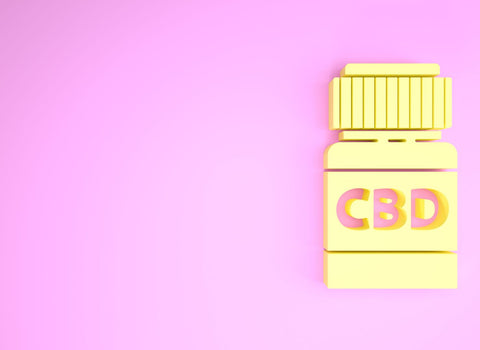
Cannabidiol (CBD) brings natural pain relief and relaxation without the harsh side effects of traditional medications. This therapeutic compound soothes different types of pain, from everyday aches to chronic discomfort, while creating a deep sense of calm.
Unlike many conventional pain relievers that come with risks, CBD’s gentle, effective approach allows for long-term use—especially when you microdose. Small, consistent doses found in our CBD gummies allow your body to maintain steady relief without building tolerance.
How does CBD relieve pain?
CBD is a non-psychoactive cannabis compound and a major cannabinoid, alongside tetrahydrocannabinol (THC). Unlike THC, CBD doesn’t have psychoactive effects, so you can consume small amounts regularly and reap its therapeutic benefits without compromising your functionality. Like other cannabis compounds, CBD works with your endocannabinoid system (ECS) to promote balance, reduce inflammation, and create a deep sense of calm.
Here’s how CBD relieves pain:
- The endocannabinoid system regulates pain perception, inflammation response, and stress levels. CBD doesn't bind directly to CB1 and CB2 cannabinoid receptors in the ECS but instead influences them indirectly. This unique interaction helps your body maintain natural balance and relief from discomfort. Polish researchers reveal that CBD competes poorly at the binding sites of CB1 and CB2 receptors but acts as a negative allosteric modulator; it can modify how these receptors respond to other cannabinoids.
- CBD enhances your body's endocannabinoids to maintain a natural balance that reduces pain and discomfort.
- A 2020 scientific commentary proposes that CBD targets pain through the anterolateral system, which controls how we perceive and process discomfort. At the same time, it reduces inflammation by modulating immune cell activity. This helps CBD block pain signals and calm inflammation without the harsh side effects of traditional painkillers.
- CBD’s powerful anti-inflammatory properties target pain at its source rather than masking symptoms. Vallanueva, et. al. explain that CBD reduces inflammation by modulating immune cell activity and decreasing the production of pro-inflammatory factors such as TNF-α and IL-6 while increasing anti-inflammatory cytokines such as IL-10. This targeted anti-inflammatory action happens systemically and locally, making CBD effective for chronic inflammatory conditions such as arthritis, muscle soreness, and joint pain.
- Muller, et. al. shed light on how CBD targets specific ion channels in your nervous system, especially TRPV1 and TRPM8, to block pain signals and calm inflammation.
- CBD promotes muscle relaxation and reduces tension, easing acute and chronic pain. This physical relaxation combines with CBD's calming mental effects to break the pain-stress cycle.
- When taken consistently, CBD maintains a balanced pain response. Unlike some pain medications that can lose effectiveness over time, CBD remains stable and doesn't create dependency.
- CBD's anxiolytic (anti-anxiety) effects are important for pain management. By reducing stress and anxiety that often accompany chronic pain, CBD improves overall pain tolerance and quality of life.
CBD works even better when combined with other cannabinoids, especially THC, through the entourage effect. The entourage effect happens when cannabis compounds work together to boost their therapeutic benefits. For example, THC and CBD together create a powerful synergy where CBD calms THC's psychoactive effects while THC enhances CBD's pain-relieving properties to deliver more complete and effective relief.
While broad-spectrum CBD packs multiple cannabinoids without THC, full-spectrum delivers the complete power of the Cannabis sativa plant, including small amounts of THC (under 0.3%). Though both options offer relief, full-spectrum CBD is more effective for pain management since THC's presence maximizes the therapeutic benefits of all other cannabinoids working together.
Get the most from every bite with our full-spectrum CBD gummies, where nature's finest cannabinoids harmonize to soothe your pain and ease your mind.
What types of pain does CBD address?
CBD can alleviate the following types of pain:
- Neuropathic pain from nerve damage, diabetes, multiple sclerosis, and chemotherapy-induced neuropathic pain
- Inflammatory pain from arthritis, autoimmune conditions, and tissue damage
- Post-workout muscle soreness, sports injuries, and exercise-related inflammation
- Chronic pain conditions such as fibromyalgia and migraines
- Joint pain, stiffness, and osteoarthritis
- Back pain and sciatica
- Cancer-related pain and treatment side effects
- Post-surgical pain and recovery
- Digestive system pain and inflammation
- General aches, discomfort, and acute pain
Our Relax gummies combine 25 mg of CBD with calming ashwagandha for a gentle approach to managing daily discomfort, while maintaining mental clarity. If you seek enhanced therapeutic benefits, our Relax Plus gummies feature full-spectrum hemp extract with 25 mg CBD and 5 mg THC. This ratio provides optimal pain relief through the entourage effect.
Read more about the potential benefits of microdosing THC and CBD.
“Like the effects this has on me. I can take it to relax, but still be able to concentrate and do things without feeling buzzed.”
How much CBD does it take to relieve pain?
Some studies suggest that CBD was most effective for pain relief at doses between 14–20 mg per kg of body weight daily. This amount seems to be well tolerated, but most people find good results with much lower doses between 10–25mg of CBD per serving. Combined with small amounts of THC, this dosage enhances the pain-relieving properties of both cannabinoids for more effective and reliable relief.
Small amounts of CBD and THC together often provide better pain relief than either compound alone. You can find the right amount by starting low with our 5 mg Bliss gummies and working your way up to our 25 mg Relax gummies for stronger support.
If you’re looking for something chill to sip on, try our Buzz Drops™. These low-dose cannabis drops enhance any beverage with a perfectly balanced 2.5 mg each of CBD and THC for gentle, all-day relief.
What is the best time to take CBD for pain?
For consistent therapeutic benefits, many people take CBD in the morning to maintain steady relief throughout the day. If you experience flare-ups at night or struggle with sleep due to discomfort, take CBD about an hour before bedtime to soothe pain and rest.
CBD works best when taken consistently so it can build up in your system. Start with a low dose in the morning (5–10 mg), and if needed, take another dose later during the day. You can adjust the timing based on your pain levels and how your body responds to CBD.
How long does CBD last for pain?
For chronic pain patients, CBD's analgesic effects typically last 4–6 hours when taken orally. The duration varies based on your medical condition, metabolism, and whether you choose broad or full spectrum options.
Many people find CBD gummies particularly effective as they provide controlled dosing and longer-lasting effects than topical products. Some alternative treatment options combine CBD with small amounts of THC for enhanced pain relief throughout the day. Consistent daily dosing maintains steady relief, especially for persistent pain and arthritis pain.
Product QUIZ
Need help deciding what product is best for you? Take our quiz, just three questions until your perfect match!
Does CBD have side effects?
CBD is safe and well-tolerated by most people with mild to no side effects. Unlike THC, CBD won't get you high or cause psychoactive effects, but your body might need time to adjust. Intense side effects are rare but may occur with high doses exceeding 100 mg daily.
Common side effects of CBD overconsumption include the following:
- Dry mouth
- Drowsiness
- Changes in appetite
- Digestive changes
- Fatigue
- Lower blood pressure
- Interactions with medications
- Diarrhea
- Nausea
That's why we prefer microdosing. Start with a low dose (below 10 mg) to find your sweet spot for pain relief. Everyone's body chemistry is unique; what causes adverse effects in one person might not affect another. How you respond to CBD depends on your body weight, metabolism, and overall health condition.
Which form of CBD is best for pain?
The right CBD form can make all the difference in your pain management journey. Here are the most effective ways to take CBD for pain relief:
- CBD oil (tinctures) taken under the tongue offers the fastest absorption into your bloodstream. You'll feel effects within 15 minutes, and adjusting your ideal dosage drop by drop is easy.
- Topical CBD applied through creams and balms targets specific areas of pain instantly. These products work wonders for joint stiffness, muscle soreness, and localized discomfort.
- CBD capsules deliver pre-measured doses that provide consistent, long-lasting effects once they kick in. It’s easy to take them with water like any other supplement.
- Vaping CBD offers almost instant effects because of its high bioavailability. The vapor enters your bloodstream through your lungs, providing quick comfort when pain strikes. Vaping isn’t the safest long-term option. The effects quickly fade, which means you'll need to vape more frequently. Plus, there are the harmful effects of vaping on lung health.
- CBD edibles (gummies and drinks) are the real MVPs of CBD consumption. This method delivers relief in the most enjoyable way possible but is also consistent, pre-measured, and perfect for managing chronic pain throughout the day. They're also discreet, portable, and delicious.
Our low-dose edibles are the perfect starting point for new and experienced users. Whether you’re going for broad-spectrum CBD products or full-spectrum options, our gummies match your needs.
Order the best pain-relieving CBD gummies
Skip unreliable corner store CBD products and choose nama™ for expertly crafted, third-party tested gummies that deliver consistent relief. Our broad-spectrum CBD gummies offer powerful benefits without THC, while our full-spectrum options include tiny amounts of THC to maximize therapeutic potential through the entourage effect.
Start with our perfectly dosed CBD gummies for daily life. Choose from:
- Broad-spectrum Anytime gummies with 10 mg CBD.
- Full-spectrum Relax Plus gummies with 25 mg CBD paired with 5 mg THC.
- Microdosed Energy gummies with 5 mg CBD and 2.5 mg THC.
- Low-dose cannabis drops with 2.5 mg of THC and CBD per full dropper.
All our gummies are vegan, gluten-free, and made with organic ingredients. We use premium American hemp and test every batch to provide safe, effective relief you can trust. Plus, they're delicious and convenient, making them easy to incorporate into your daily wellness routine.
All of our cannabis edibles are federally legal in the US, so what are you waiting for?
CBD for pain FAQ
Unlike medical cannabis and many THC-rich products, your first CBD experience will be subtle and non-intoxicating. Most people report a gentle sense of relaxation and comfort as CBD starts working with their body's natural systems. Common effects include reduced tension, mental clarity, and mild pain relief.
Start with low doses (5–10 mg) for the best results. Hemp-derived CBD products can take 30–60 minutes to kick in when eaten. Everyone responds differently, so some people will feel immediate benefits, while others develop positive effects over several days of consistent use.
CBD has a strong safety profile, but excessive amounts may cause mild adverse events. These might include drowsiness, digestive discomfort, or dry mouth. Unlike traditional pain medications, CBD shows no potential for abuse or serious negative side effects even at higher doses.
For optimal therapeutic benefits, start with low doses and increase gradually based on your body's response. Always choose third-party tested natural products from reputable sources.
CBD is safe for liver health when taken as directed. Since CBD interacts with liver enzymes that process medications, if you have existing liver conditions or take prescription drugs, consult with your health care provider. Scientific evidence around liver toxicity primarily involves extremely high doses far above typical usage for pain or anxiety. Human studies using reasonable doses show minimal liver-related adverse events.
Many conventional pain medications simply mask symptoms, but CBD works by targeting underlying inflammation and pain signaling pathways. CBD offers natural treatment potential through multiple mechanisms: reducing inflammation, calming overactive pain signals, and promoting balance in the body's pain response systems. Clinical studies show promising analgesic effects of cannabidiol for conditions such as arthritis pain and chronic pain.
CBD can affect how your liver processes certain medications. Common medications that may interact with CBD include the following:
- Blood thinners (Warfarin)
- Anti-seizure medications (Clobazam, Lamotrigine)
- Antidepressants (SSRIs, tricyclics)
- Heart rhythm medications
- Thyroid medications
- Some antihistamines
- Immune system suppressants
- Certain pain medications
- Blood pressure medications
If you take any prescription medications, especially those with a "grapefruit warning," consult your healthcare provider before starting CBD. They can evaluate potential interactions and help you safely incorporate CBD into your treatment plan while monitoring your response.
Most people experience subtle but positive effects from hemp-derived CBD products—a gentle sense of physical comfort and mental calm rather than intoxication. Unlike medical marijuana, CBD won't make you feel high. The experience depends on your medical condition and whether you choose broad-spectrum or full-spectrum options.
Many chronic pain patients report feeling more relaxed, with reduced tension and discomfort. Some people notice immediate effects, while others develop stronger positive effects after several days of regular dosing. Remember that CBD's therapeutic benefits build over time through consistent use.
Begin with a low dose, around 5–10 mg, and gradually increase dosages, paying attention to how you feel. Your health, pain levels, body weight, and the type of CBD (broad or full-spectrum) all impact the right dosage. While some conditions may require higher amounts, many find relief with smaller doses.
It may also help to keep a record of your experience so you can discover your ideal dose. For personalized guidance, consult a medical professional experienced with cannabis-based effective treatments. The goal is to find an effective dose that avoids side effects.
Top Sellers
New? Start with our Ultimate Sampler!

THC: 10 mg | CBC: 10 mg | CBD: 10 mg | CBG: 5 mg | CBN 5mg
Resources
Mlost J, Bryk M, Starowicz K. Cannabidiol for Pain Treatment: Focus on Pharmacology and Mechanism of Action. Int J Mol Sci. 2020 Nov 23;21(22):8870. doi: 10.3390/ijms21228870. PMID: 33238607; PMCID: PMC7700528.
Svensson, C. K. (2020). CBD for the treatment of pain: What is the evidence? Journal of the American Pharmacists Association, 60(6), e80-e83. https://doi.org/10.1016/j.japh.2020.06.009
Villanueva MRB, Joshaghani N, Villa N, Badla O, Goit R, Saddik SE, Dawood SN, Rabih AM, Niaj A, Raman A, Uprety M, Calero M, Khan S. Efficacy, Safety, and Regulation of Cannabidiol on Chronic Pain: A Systematic Review. Cureus. 2022 Jul 16;14(7):e26913. doi: 10.7759/cureus.26913. PMID: 35860716; PMCID: PMC9288157.
Muller C, Morales P, Reggio PH. Cannabinoid Ligands Targeting TRP Channels. Front Mol Neurosci. 2019 Jan 15;11:487. doi: 10.3389/fnmol.2018.00487. PMID: 30697147; PMCID: PMC6340993.
Millar SA, Stone NL, Bellman ZD, Yates AS, England TJ, O'Sullivan SE. A systematic review of cannabidiol dosing in clinical populations. Br J Clin Pharmacol. 2019 Sep;85(9):1888-1900. doi: 10.1111/bcp.14038. Epub 2019 Jul 19. PMID: 31222854; PMCID: PMC6710502.
Further reading
The benefits of Buzz Drops for pain relief
Is sativa or indica better for pain relief?
Try our best pain-reducing Delta 9 gummies
Delta 8 vs Delta 9 for pain management
How does hybrid cannabis relieve pain?
How to microdose edibles for enhanced focus
The benefits of cannabis microdoses for mental health
nama CBD FDA & legal disclaimer
Our products are not intended to diagnose, treat, cure, or prevent any disease. They are not a replacement for prescription medications and have not been evaluated by the Food and Drug Administration (FDA).
The information provided on this website does not and is not intended to, constitute legal advice or any statements of the status of any laws. Any information, content, and materials available on this site are for general informational purposes only and are not intended to be relied upon for any purpose.
Readers of this website should contact their attorney to obtain advice concerning any particular legal matter including decisions on what products are, or are not, legal to sell, possess, or consume. No reader, user, or browser of this site should act or refrain from acting based on information on this site without first seeking legal advice from their counsel in the relevant jurisdiction.
Only your individual attorney can provide assurances that the information contained herein – and your interpretation of it – is applicable or accurate for your particular situation. Use of, and access to, this website or any of the links or resources contained within the site do not create an attorney-client relationship between the reader, user, or browser, and website authors, contributors, contributing law firms, or committee members and their respective employers.
About
Learn
Join us on this journey

© Copyright 2026 nama Products LLC. All Rights Reserved.
†These statements have not been evaluated by the Food and Drug Administration. These products are not intended to diagnose, treat, cure or prevent any disease. All information presented here is not meant as a substitute for or alternative to information from health care practitioners. Please consult your health care professional about potential interactions or other possible complications before using any product.
††The information provided on this website does not, and is not intended to, constitute legal advice or any statements of the status of any laws. Any information, content, and materials available on this site are for general entertainment purposes only, and are not intended to be relied upon for any purpose.
nama: The only source for Buzz Drops™

By clicking ‘Yes,’ you agree to our
Terms & Conditions and Privacy Policy
123 John Doe Street
Your Town, YT 12345
Store Hours
Sun: Closed
Mon-Fri: 9:00 - 17:00
Sat: 10:00 - 13:00
What to expect at pickup
Closed
Closing at 5pm
Closing at 5pm
Closing at 5pm
Closing at 5pm
Closing at 5pm
Closing at 1pm

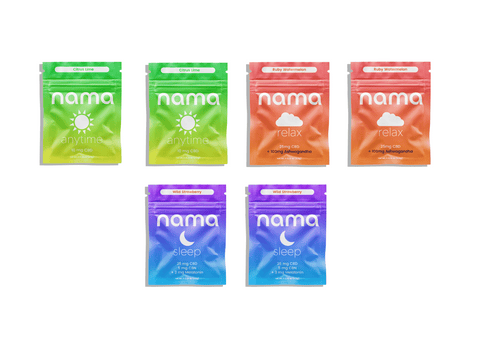
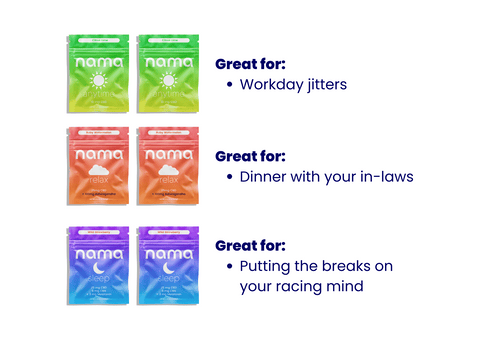
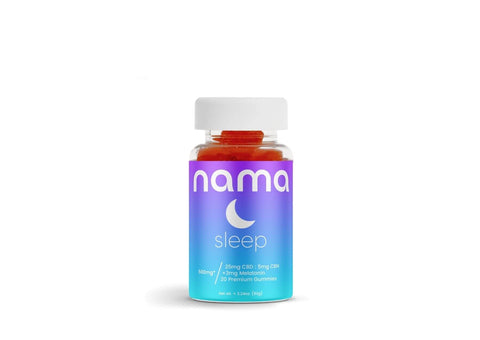
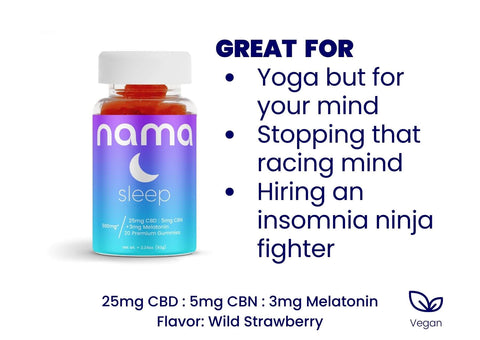
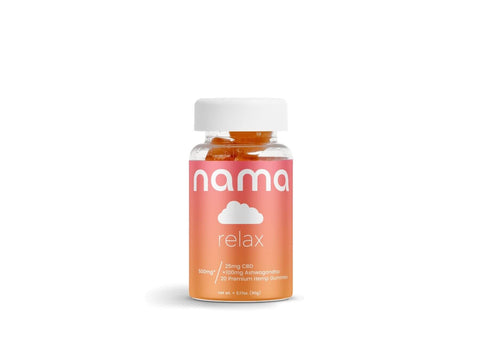
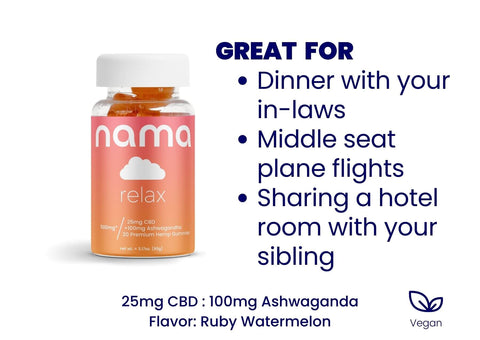
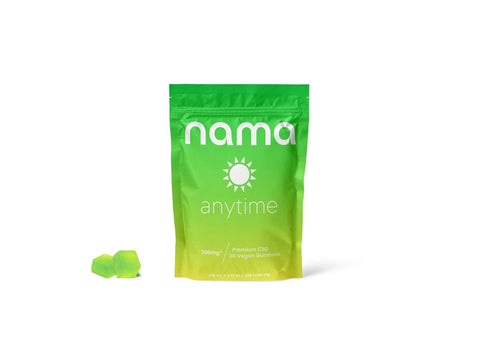
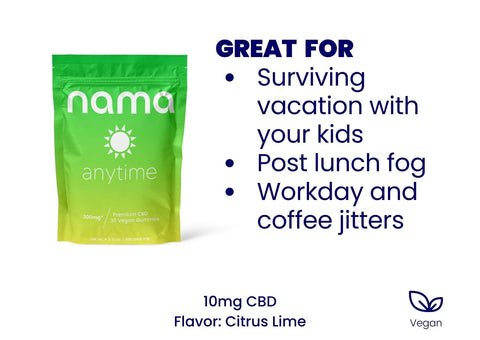
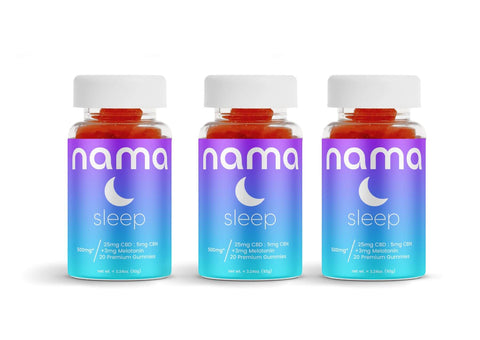
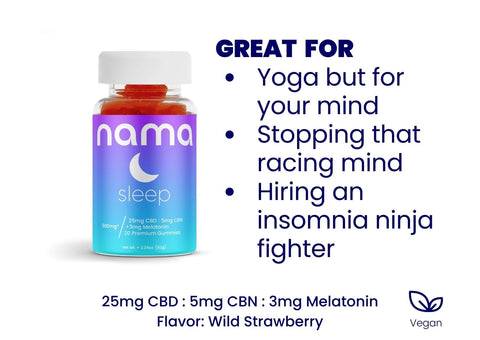
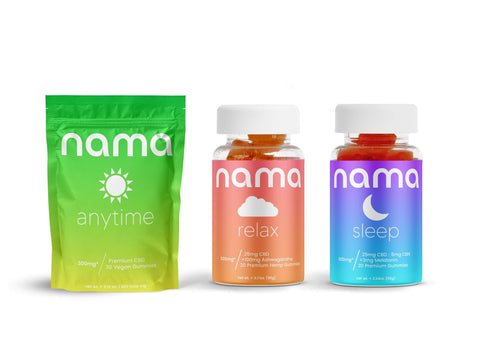
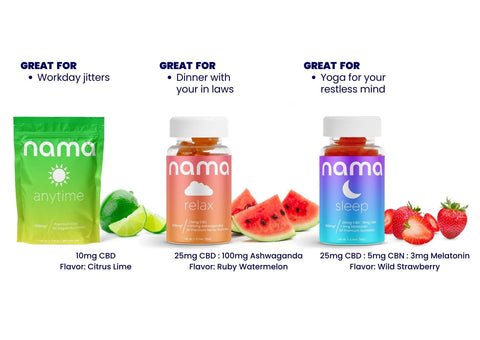








![Buzz Packs™ [THC and CBD Powder Drink Mix]](http://www.namacbd.com/cdn/shop/files/nama_buzz_packs_thc_drink_pack_white_background.png?v=1769586244&width=480)
![Buzz Packs™ [THC and CBD Powder Drink Mix]](http://www.namacbd.com/cdn/shop/files/Buzz_Packs_Label.png?v=1769586244&width=480)
![Buzz Drops™ [THC Drink Drops]](http://www.namacbd.com/cdn/shop/files/nama_thc_buzz_drops.png?v=1711412866&width=480)
![Buzz Drops™ [THC Drink Drops]](http://www.namacbd.com/cdn/shop/files/buzz-drop-wine-comparison.png?v=1736882023&width=480)
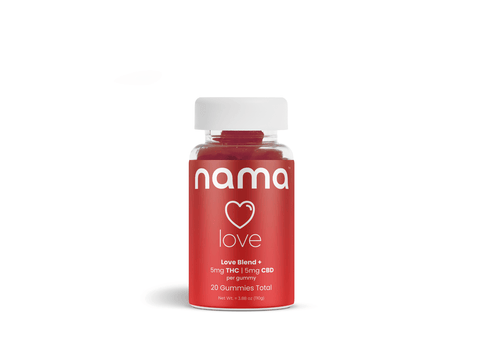
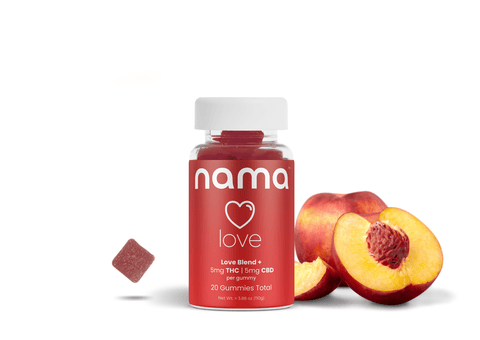


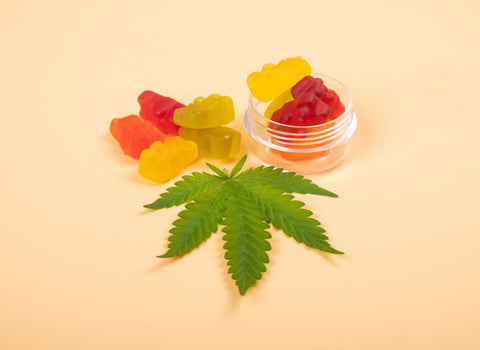
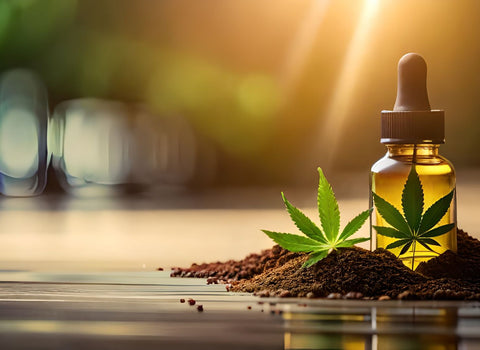

Comments (0)
There are no comments for this article. Be the first one to leave a message!